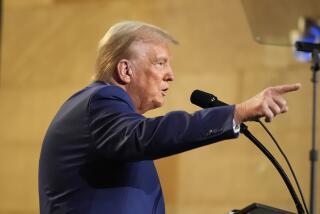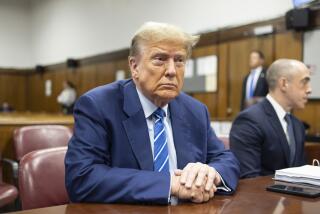Opening statements set for Monday in Trump’s hush money criminal case

NEW YORK — A full jury of 12 people and six alternates was seated Friday in Donald Trump’s hush-money case, setting the stage for opening statements next week in the first criminal trial of a former U.S. president.
Hours later, an appeals court judge rejected a last-minute bid by the Republican to halt the trial over his claims that jury selection was unfairly rushed.
The jury — which includes a software engineer, investment banker, English teacher and multiple lawyers — took final shape after lawyers spent days quizzing dozens of potential jurors on whether they can impartially judge the presumptive Republican presidential nominee.
The trial unfolding in Manhattan thrusts Trump’s legal problems into the heart of his hotly contested race against President Biden, with Trump’s opponent likely to seize on unflattering and salacious testimony to make the case that Trump is unfit to return as commander in chief.
Trump, meanwhile, is using the prosecution as a political rallying cry, casting himself as a victim while juggling his dual role as criminal defendant and presidential candidate.
Judge Juan Merchan said lawyers will present opening statements Monday morning before prosecutors begin laying out their case, alleging a scheme to cover up negative stories Trump feared would hurt his 2016 presidential campaign.
Despite the failure of previous attempts to delay the trial, a Trump attorney was in an appeals court hours after the jury was seated, arguing that Merchan made it impossible for Trump to get an impartial panel by speeding through the selection process.
“To think an impartial jury could be found in that period of time, I would respectfully submit, is untenable,” attorney Clifford Robert said.
Justice Marsha Michael denied the request just minutes after a brief hearing.
Back in the trial court, Merchan expressed frustration as Trump’s lawyers pressed to revisit a litany of pretrial rulings.
“At some point, you need to accept the court’s rulings,” Merchan said. “There’s nothing else to clarify. There’s nothing else to re-argue. We’re going to have opening statements on Monday morning. This trial is starting.”
Just after the jury was seated, emergency crews responded to a park outside the courthouse, where a man had set himself on fire. The man took out pamphlets espousing conspiracy theories and spread them around the park before dousing himself in a flammable substance and setting himself aflame, officials said. He was in critical condition Friday afternoon.
Trump has spent the week sitting quietly in the courtroom as lawyers press potential jurors on their views about him in a search for any bias that could preclude them from hearing the case. During breaks in the proceedings, he has lashed out about the allegations and the judge to cameras in the hallway, using his mounting legal problems as a political rallying cry to try to cast himself as a victim.
Prosecutors in Trump’s New York hush-money trial are asking that the former president be held in contempt of court and fined for violating a gag order.
Over five days of jury selection, dozens of people were dismissed from the jury pool after saying they didn’t believe they could be fair. Others have expressed anxiety about having to decide such a consequential case, with outsize media attention. The judge has ruled that jurors’ names will be known only to prosecutors, Trump and their legal teams.
One woman who had been chosen to serve on the jury was dismissed Thursday after raising concerns over messages she said she got from friends and family when aspects of her identity became public. On Friday, another woman broke down in tears while being questioned by a prosecutor about her ability to decide the case based only on evidence presented in court.
“I feel so nervous and anxious right now,” the woman said. “I’m so sorry. I wouldn’t want someone who feels like this to judge my case either. I don’t want to waste the court’s time.”
As more potential jurors were questioned Friday, Trump appeared to lean over at the defense table, scribbling on papers and exchanging notes with one of his lawyers. He occasionally perked up and gazed at the jury box, including when one would-be juror said he had volunteered in a “get out the vote” effort for Hillary Clinton’s campaign.
Trump spoke to reporters before Friday’s proceedings got underway, railing against a gag order that prosecutors have accused him of violating. Merchan has scheduled arguments for next week on prosecutors’ request to hold Trump in contempt of court and fine him for social media posts they say defy limits on what he can say about potential witnesses.
“The gag order has to come off. People are allowed to speak about me, and I have a gag order,” Trump said.
A flood of cheap Chinese electric car exports has raised the specter of another trade war with the U.S. And it has Tesla worried.
Merchan also heard arguments Friday on prosecutors’ request to bring up Trump’s prior legal entanglements if he takes the stand in the hush money case. Manhattan prosecutors have said they want to question him about his recent civil fraud trial that resulted in a $454-million judgment after a judge found Trump had lied about his wealth for years. He is appealing that verdict.
The hush money trial centers on a $130,000 payment that Michael Cohen, Trump’s former lawyer and personal fixer, made to adult film actor Stormy Daniels to prevent her claims of a sexual encounter with Trump from becoming public in the final days of the 2016 race.
Prosecutors say Trump obscured the true nature of the payments in internal records when his company reimbursed Cohen, who pleaded guilty to federal charges in 2018 and is expected to be a star witness for the prosecution.
Trump has denied having a sexual encounter with Daniels, and his lawyers argue that the payments to Cohen were legitimate legal expenses.
Trump faces 34 felony counts of falsifying business records. He could get up to four years in prison if convicted, though it’s not clear that the judge would opt to put him behind bars. Trump would almost certainly appeal any conviction.
Trump is involved in four criminal cases, but it’s not clear that any others will reach trial before the November election. Appeals and legal wrangling have caused delays in the other three cases, charging Trump with plotting to overturn the 2020 election results and with illegally hoarding classified documents.
Associated Press writers Peltz, Sisak and Offenhartz reported from New York and Richer from Washington.
More to Read
Sign up for Essential California
The most important California stories and recommendations in your inbox every morning.
You may occasionally receive promotional content from the Los Angeles Times.












